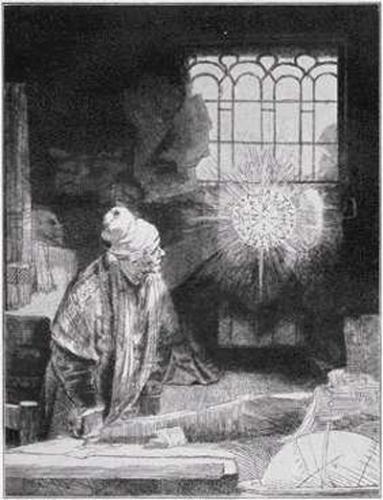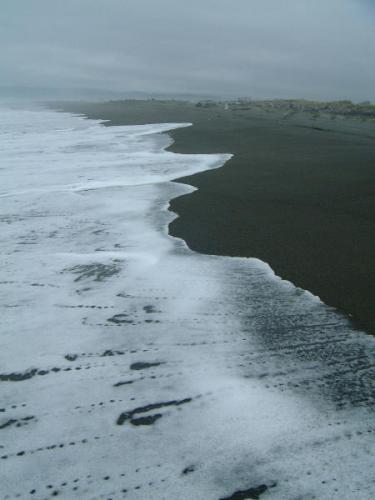It’s 4:15 in the morning and I‘m moving smoothly down the cloister of the Shasta Abbey toward the Buddha Hall for the first meditation period of the day. The stars are pulsing in the crisp air, a temple bell tolls softly in the distance. My body and mind are thickened and distorted in a jetlag-like discomfort. I could be miserable. Instead, I feel like a transparent jewel sinking slowly into some welcoming oceanic depth.
I slip through the door of the Buddha Hall with a bow and enter into the candle-lit darkness. There is the delicate swoosh of robes as monks move about setting up the Hall. Crossing the room, I bow to the altar and stand, pausing for a moment to take it all in, to be just here. Even rushing to my sitting place would be a distraction.
I am before my sitting place, bowing, and suddenly I feel I am bringing where I truly sit to this particular spot. Nothing more, nothing less, nothing to think too much about. The jewel continues sinking.
Settling further into the stillness after the meditation bell rings, there is the sound of Rev. Master Jiyu’s grandfather clock ticking, the sensations of my body settling in, the noticing of thoughts thrown up like graffiti on a wall that then slide away. Emotions bubble up, some with images, and go the way of the graffiti-thoughts. I notice a smoothness to it all, a gentle and seductive pleasure. I notice that the clock’s tick has disappeared and returns at the moment it’s loss is noticed. How easily I am pulled from my sitting place by small pleasures, little absorptions. It’s helpful to have the tick-tock and to hear each tick and each tock.
The bell signals the end of the meditation period and the bowing helps loosen up my spine and open my heart. As we begin walking meditation, the slow and deliberate steps work to further align my body. The tick-tock returns as I find my internal “sitting place” while taking each step, every step.
Two tings of the inken (signal gong) end walking meditation. A bow in the walking meditation circle, a bow to my sitting place, a bow to the sangha in front of me and all beings, and I am back in my sitting place. Tick-tock….tick-tock…
I notice now that I am waiting for something. Oh, I’m waiting for the seven morning beats from the huge drum in the Buddha Hall. Roaring beats that vibrate the body and brighten the mind – or wake me up if I’ve drifted into dozing. I used to resist waiting, which of course turned waiting into impatience. Now waiting has more openness to what might show up next. And that translucent jewel wordlessly says go ahead, you wait, I’ll just keep dropping deeper.
It’s mid-afternoon. I’m on my way to the kitchen for meal preparation. Fatigue is showing up and I’m containing it with a sort of “Zen sternness”, a bit of a frown, stiffer movements, a serious bearing. This doesn’t feel right. I want to loosen up but I don’t know how. That little unspoken voice now says smile into your heart! And it happens just like that. No method, nothing really to do other than notice. I’m every bit as fatigued, but lighter somehow. Now people are smiling back at me as I near the kitchen.
An animal funeral. Fritz the schnauzer has died. As I make an offering, I remember his vitality even when he was deaf and blind. I reach for gratitude that his suffering is through, but stumble instead over my own anticipatory grief at losing our aging dog. I touch Fritz’s body to scratch his ears and I am shocked by the lifelessness of his corpse. I have touched dead bodies before – parents, work mates, strangers – but this throws me. I am not pulled off of my sitting place, I am yanked off and thrown down. I am split open from head to toe, a schism opens in the universe.
A flood of questions arises: how can Fritz be so dead when he was so alive? If alive and dead are so different, what to make of this discontinuity? How can his corpse have Buddha Nature? Is all of this ceremonial a sham to make us feel better? These questions come not as words but as flashes of deep emotions of fear and sadness, a spiraling down to a core abyss of vacuity and meaninglessness. The heart-smile is frozen in ice.
I stand by the grave-site in the animal cemetery, reciting the Homage to the Buddha’s Relics with the monks and lay sangha. With the others, I put a shovel of dirt in the grave and join the procession back to the cloister. The fissure continues but to a lesser degree. I ask for help, a quiet internal cry. The little unspoken voice says you’re being given everything you need exactly when you need it, you don’t need to reach for more. I find myself talking back with some defiance: “but I’m not reaching, I’m resisting”, and the tears flow.
Sitting in meditation again, looking at that resistance. Just looking at it. No manipulation, no resistance. A quote, possibly from Dogen, comes to mind: When a piece of wood burns, don’t confuse the ashes with the wood. When there is wood, there is wood. When there are ashes, there are ashes.
I’m walking to the kitchen to join in the food prep. A monk smiles at me and my heart thaws.
This heart-smile is carrying me through my tiredness, through aches and pains of hours of sitting. It helps me see through my arising defensiveness when being corrected for tasks I misunderstood and provides the space to just simply bow. It helps me not resist the clouded mind-states or bristling memories that show up from time to time. There’s lucidity to this heart-smile that is not to be looked at but to be looked through; the lucidity of the jewel, which now spreads in all directions.

